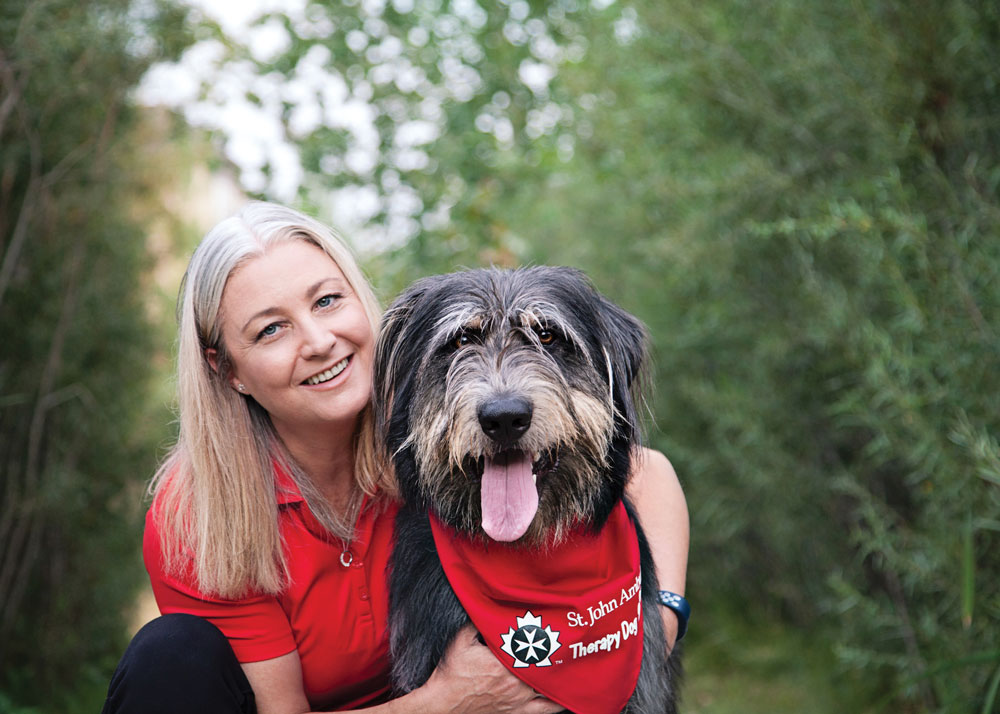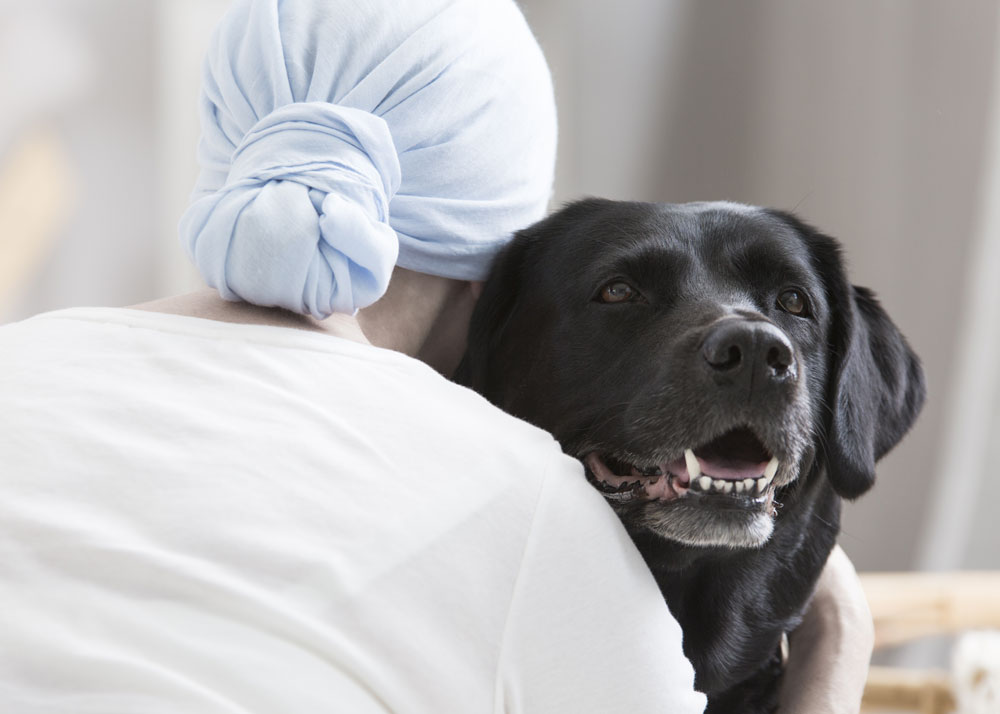

Could Your Dog Be a Therapy Dog?
Find out if your dog has what it takes to be a therapy dog
You passed!” I exclaimed. “You’re now a therapy dog team. Congratulations!” The woman had tears in her eyes as she beamed back at me, her little Pekingese mix dancing at her feet. They were a great team, and I knew they would go on to make many people happy as they started their volunteer efforts.
Volunteering with your dog can be extremely fulfilling. Therapy dog teams visit hospitals, nursing homes, schools, and more. They attend therapy groups ranging from addiction recovery to bereavement. They visit disaster sites and comfort victims and first responders. They help children learn to read.
Great therapy dogs are the perfect combination of temperament and training. Not every dog is cut out for the job. Do you think your dog has what it takes?
Photo Sarah Daloise: Therapy dog team Jaime Nielsen and Fred
Social Butterflies
Your dog must love strangers the minute they meet. Every new person is a new best friend. If your dog takes a while to warm up to certain people, then this may not be the right job for them. If your dog is fearful or anxious around people, then this is definitely not the job for them, as it would be too stressful.
I once tested a cute little Corgi. I went to hug him, which was part of the test, and he growled at me.
“Oh, he doesn’t like to be touched,” his pet parent explained. “But he does all sorts of tricks! He even rides a skateboard!” The team did not pass. People want to pet therapy dogs, that’s kind of the point! A dog who will growl at someone touching him is not appropriate for therapy work.
Dogs also need to be confident and comfortable in a variety of environments. Hospitals contain machines that beep and loud carts that rattle down hallways. Schools have loudspeakers.
Is your dog:
(a) Easily startled by noises?
(b) Trot into unfamiliar places like he owns them?
(c) Cower a bit and take a while to get his bearings?
B is ideal. If A or C, then your dog will need socialization and behaviour modification to increase his confidence. Work with a professional, reward-based trainer to help your dog be less afraid. Keep in mind socialization isn’t just taking your dog to new locations. It’s making sure your dog has a wonderful time in those locations. Bring his favourite treats and ensure that he is happy and relaxed.
Therapy dogs should also be safe and happy in the presence of other dogs. If your dog growls or barks at other dogs, he is not ready for therapy work. Some therapy groups visit in teams, or you may visit a facility that allows personal pets. It would not be appropriate for a visiting dog to be aggressive or fearful of other dogs.
An A+ in Manners
It’s not enough that your dog is super friendly. He also must be well- behaved in public. Just because a dog will listen to you in your living room or yard doesn’t mean he will respond to your cues elsewhere. You need to train him in a variety of places, so he listens to you wherever you go.
If your dog growls or barks at other dogs, he is not ready for therapy work.
Therapy dogs do not pull when on leash or jump on people. Can you imagine your 55-pound Golden Retriever jumping on Grandma at the assisted living facility? Or happily bumping into a small child?
At the very minimum, therapy dogs need to be able to:
✓ Sit
✓ Lie down
✓ Come when called
✓ Walk nicely on leash, even with distractions
✓ Leave tempting items alone when told
✓ Hold a ‘stay’ position
Making the Grade
There are many therapy groups, national and local, such as Pet Partners or St. John’s Ambulance’s Therapy Dog Program. Each has different requirements. For example, some require you take a class, some require written tests, others require you first pass the American Kennel Club’s Canine Good Citizen test. All require you to pass a skills test with your canine partner. It’s best to research a couple and see which one best fits you and your dog. If you join a group, you’ll get the benefit of networking with experienced teams. You’ll also get liability insurance, which is critical to protecting yourself and your personal property.
Photo ground picture/shutterstock
Please don’t be upset if you don’t pass the test the first time. This is very common! A test that is super easy isn’t much of a test, is it? For example, your dog may be extremely friendly and confident, but still jumps on people. Work on his training until this is no longer a problem.
Remember, You’re a Team
Your dog is only visiting because you take him. Always remember that you are the most important member of the team, because you are the one keeping your dog safe, healthy, and happy in his volunteer duties. Always advocate for your dog. Never push him past his limitations, and be mindful of signs of stress. For example, do you find your dog avoiding people or certain places? Do you see him lick his lips, yawn, or turn away from people? Is he whining or barking? These are all signs of stress. Failing to recognize them will add more stress to your dog. A dog shouldn’t have to growl, snap, or bite to let you know he is unhappy. He will tell you far in advance. Learning to recognize your dog’s signs of stress is a prerequisite to therapy work.
Also be mindful that you need to be comfortable in the places you visit. Does it cause you stress to see children in the hospital? Does it upset you to visit seniors in nursing homes? Would you be on edge visiting inmates in prison? Don’t feel bad if certain facilities make you uncomfortable, as this is very common. If you are nervous, your dog will be, too. There are so many who can benefit from therapy visits, you are sure to find a population and place that you and your dog both enjoy.
Therapy vs. Service Dogs
Service dogs perform specific tasks for their owners who have disabilities. Therapy dogs provide comfort to a variety of populations in a variety of facilities. They are not the same, and they do not have the same rights under the Americans with Disabilities Act (ADA). For example, service dogs are permitted to accompany their owners in public places. Therapy dogs do not have the same right of access.
Is therapy work right for you and your dog?
✓ Do you enjoy sharing your special dog with others?
✓ Do you have the time to visit regularly? (Even one time a week.)
✓ Is your dog well-trained, even in intense and distracting environments?
✓ Is your dog temperamentally suited to visiting and cuddling with strangers, including children and the elderly?
Give Back
Volunteer opportunities for therapy dogs include:
- Nursing homes
- Hospitals
- Schools
- Special Needs Centers
- Libraries
- Bereavement Groups
- Addiction Recovery Groups
This article originally appeared in the award-winning Modern Dog magazine. Subscribe today!
Join the newsletter and never miss out on dog content again!
"*" indicates required fields
By clicking the arrow, you agree to our web Terms of Use and Privacy & Cookie Policy. Easy unsubscribe links are provided in every email.

